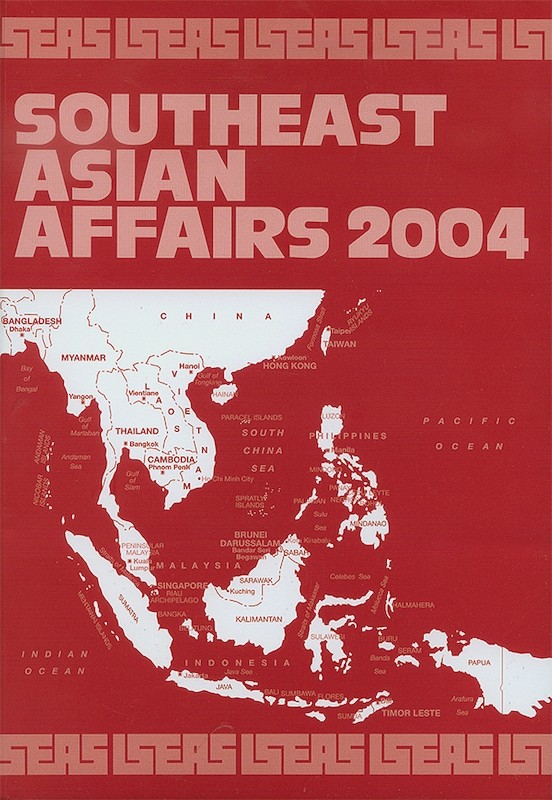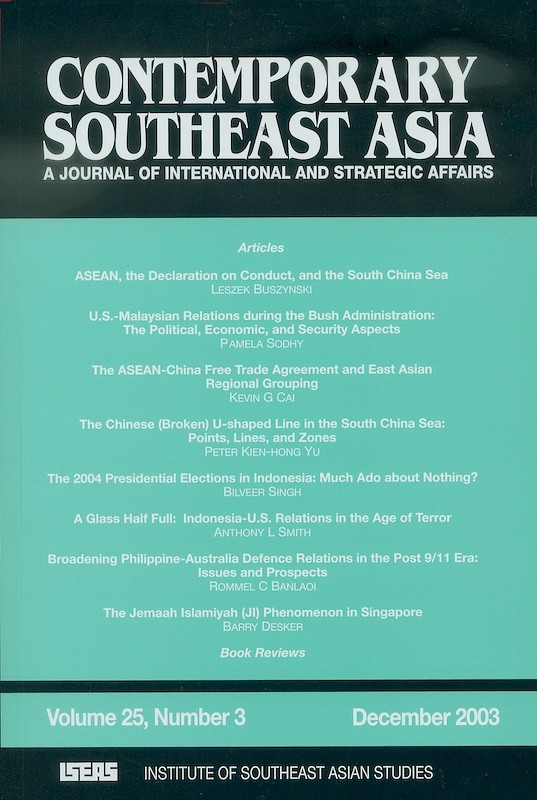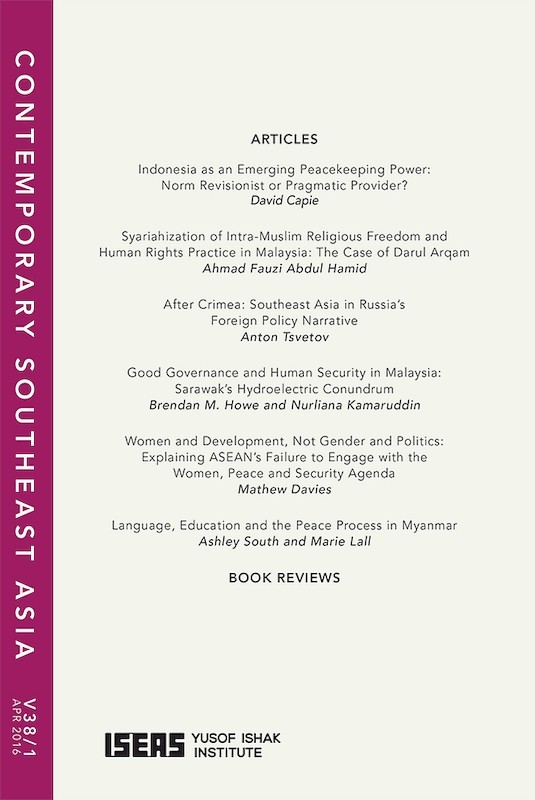Contemporary Southeast Asia: A Journal of International and Strategic Affairs Vol. 24/3 (Dec 2002)

Date of publication:
January 2003
Number of pages:
200
Code:
CS24/3
About the publication
An internationally refereed journal that specializes in the politics, international relations and security-related issues of Southeast Asia and the Asia-Pacific.
Contents
-
Contemporary Southeast Asia: A Journal of International and Strategic Affairs Vol. 24/3 (Dec 2002)
-
Preliminary pages
-
Tentacles of Terror: Al Qaeda's Southeast Asian Network, by Zachary Abuza, author see abstractThe terrorist attacks of 11 September 2001 on the United States shocked the world and resulted in a global campaign against terrorist groups. Southeast Asian states, long considered the Islamic periphery, owing to their moderate Islamic stance, pluralism and secularism, were suddenly forced to confront a small but potent terrorist threat in their midst, culminating in the 12 October 2002 attack on a Balinese resort. Osama bin Laden's Al Qaeda had entered the region beginning in the early to mid-1990s, establishing independent cells and assisting and liaising with indigenous Islamic insurgencies that hitherto were believed to have solely domestic agendas. This article analyses the origins, linkages, and network that Al Qaeda established in Southeast Asia. Though the extent of Islamic radicalism and terrorist activity is small by comparison to the Middle East or South Asia, it is still of great concern to the governments in Southeast Asia.
-
Transition Pathways and Democratic Consolidation in Post-Marcos Philippines, by Temario C Rivera, author see abstractThis article examines the political legacies of the transition process from authoritarian to democratic rule in the Philippines and their impact on the process of democratic consolidation. The consolidation process has been particularly difficult because of a combination of the following factors: a state with weak capacities, a vibrant but contentious civil society, and a slow growth economy that has accentuated class, regional, and religious cleavages. In the post-Marcos era, an outstanding feature of the consolidation process, however, has been the unusual ability of militant social movements to be part of the broader process of democratic incorporation through the electoral party-list system while maintaining their contentious politics of claim-making on behalf of marginalized sectors. This unique feature constitutes an important aspect of the consolidation process that the state needs to address, particularly in the context of its capacity-building efforts.
-
Anti-Party Reaction in Indonesia: Causes and Implications, by Paige Johnson Tan, author see abstractIn contemporary Indonesian politics, an anti-party reaction can be observed in attempts to curtail the nations political parties. This can be seen in the creation of the Dewan Perwakilan Daerah, or Senate, a party-less institution, and efforts by non-governmental organizations to create an independent constitutional commission. Revised election laws now being considered will also attempt to limit the power of the parties, particularly the party centres. This article explains the anti-party backlash as a result of the legacy of anti-party attitudes, the parties behaviour across the transition, the strong position of the parties as set out in the 1999 election laws, and the current state of public opinion towards the parties. The anti-party reaction contains within it the prospect of de-legitimating the parties as a cornerstone of Indonesia's contemporary democracy.
-
Human Security in Vietnam, Laos, and Cambodia, by Pierre P Lizee, author see abstractDefinitions of human security vary greatly, though they all coalesce on one central element: the emphasis on the need to protect the individual because it is only when individuals are secure that broader national and international institutions can themselves be legitimate and secure. The concept seems to be emerging at the moment as something of a rallying cry for civil society organizations in Southeast Asia because it provides them with a powerful argument against the state-centred model of economic and political development at the heart of the evolution of the region in recent decades. Many of these issues have been considered recently in the literature, especially for countries like Thailand and Indonesia, where notions of civil society and human security resonate quite strongly. This article considers three countries which so far have been neglected in such studies: Vietnam, Laos, and Cambodia.
-
Partnership for Peace in Asia: ASEAN, the ARF, and the United Nations, by Mely Caballero-Anthony, author see abstractThe end of the Cold War has renewed attention on regionalism and a reconsideration of the security role of regional security organizations in promoting international peace and security. However, the capacities of regional organizations differ, particularly when analysed within the general framework of peace operations. In Asia, for example, the nature and types of peace operations undertaken by regional organizations such as ASEAN and the ARF have been remarkably different when compared with regional organizations elsewhere. This article examines the nature of peace operations in the Asia-Pacific region and explores the possibilities for partnership in peace between the United Nations, on the one hand, and ASEAN and the ARF, on the other. It argues that the changing strategic environment requires a more pro-active engagement of ASEAN and the ARF in peace operations, which would involve reviewing and/or changing existing conflict prevention mechanisms to be more responsive to current challenges.
-
China's Expanding Maritime Ambitions in the Western Pacific and the Indian Ocean, by Lee Jae-Hyung, author see abstractThis article concentrates on China's apparent intention to expand its maritime influence into the Western Pacific and the Indian Ocean. Since the dissolution of the Soviet Union, China's fear of a major land war has been diminished. Instead, China's leaders have realized the role of naval power in the promotion of China's economic interests, diplomatic ascension, and national prestige. China faces overlapping claims in the Spratly and Diaoyutai (Senkaku) Islands with neighbouring countries, and Beijing has recognized the importance of sea-lines of communication from the Persian Gulf to China, as it became a net oil importer since 1993. This strategic environment has made China modernize its naval forces and expand maritime diplomacy around the globe. Moreover, China intends to become a peer competitor to the United States. How effectively the United States and regional countries handle China's naval ambitions will have consequences for overall security in the Asia-Pacific.
-
The Clash of Paradigms: International Administration and Local Political Legitimacy in East Timor, by Tanja Hohe, author see abstractCenturies of Portuguese rule and decades of Indonesian rule over East Timor did not manage to eradicate local socio-political structures that have proved resilient. It is, therefore, not surprising that a state-building exercise by the international community was unable to have much effect on, let alone transform, the local level. This article assesses the clash between the international paradigm of attempting to (re)build the Western liberal-style, democratic state under UNTAET and the existing indigenous paradigm of traditional political legitimacy that prevails among the majority of the population at the local level. Without reconciling the two in future UN interventions, such efforts will continue to be either irrelevant to a self-evolving reality or in fact cause local systems to collapse without being able to adequately replace them. The puzzle of how to build local government, given the two unrelated paradigms, has to be solved.
-
Australia's Peacekeeping Role in the Post-Cold War Era, by Derek McDougall, author see abstractGlobalism, nationalism, and regionalism were important themes in the rationale of the pre-1996 Labor government in Australia for involvement in peacekeeping, but the latter two have become increasingly important. Since 1996, the conservative Coalition government has focused primarily on nationalism and regionalism; East Timor was the most significant peacekeeping operation ever undertaken by Australia. In normal circumstances, the major domestic influences on Australian approaches to peacekeeping emanate from the foreign policy and defence bureaucracies and from the foreign minister. At the international level, pressures relating to regional developments and the involvement of the United States and the United Nations are important.
- BOOK REVIEWS
-
BOOK REVIEW: Pacific Asia? Prospects for Security and Cooperation in East Asia, by Mel Gurtov, by Chin Kin Wah, author
-
BOOK REVIEW: The Politics of Multiculturalism: Pluralism and Citizenship in Malaysia, Singapore, and Indonesia, edited by Robert W. Hefner, by Meredith L Weiss, author
-
BOOK REVIEW: Fear and Sanctuary: Burmese Refugees in Thailand, by Hazel J. Lang, by Maitri Aung-Thwin, author
-
BOOK REVIEW: Nuclear India in the Twenty-First Century, edited by D.R. Sardesai and Raju G.C. Thomas, by Arabinda Acharya, author




